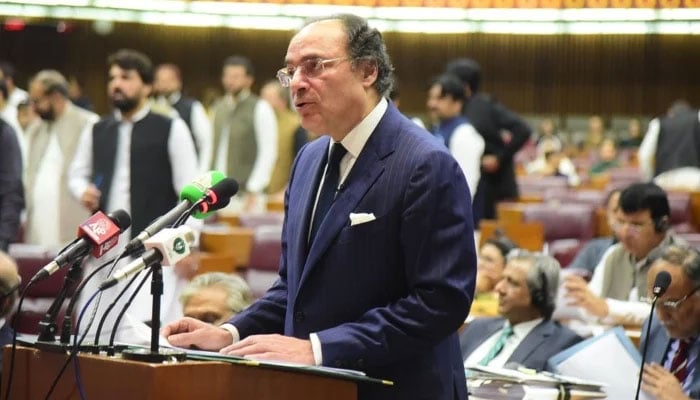No more exemptions?
LAHORE: The budget debate has not yet started in the National Assembly, but victims of additional taxes and even those who used to enjoy undue protection have started expressing their concerns.
Many economists think that budgetary targets are unachievable unless new measures are announced. It seems impossible to achieve the revenue target with current budgetary measures which, if fully realized, will still be around Rs1 trillion short, after accounting for natural growth factors like inflation.
The government estimates that inflation would be around 12 per cent next year. The state has overstated revenue expectations from current taxation measures and understated inflation that is likely to settle at around 19 percent.
It seems that no proper homework was done while preparing the budget. The purpose was simply to come as close to IMF aspirations as possible.
Economic planners have tried to please public representatives by announcing a huge development budget, allowing MNAs to get funds for projects in their constituencies. The finance minister has announced that only 20 per cent funds or Rs300 billion will be utilized for new schemes and Rs1200 billion for pending schemes. It seems that to appease the electorate, funds for new schemes will be released first and pending schemes will remain pending if the government falls short of funds -- development funds face cuts whenever there is a fund shortage.
The government’s inability to cut its expenditure is the most deplorable aspect of the budget. Prime Minister Shehbaz Sharif first assumed office after Imran Khan was ousted in 2021. From day one he vowed to reduce the size of the cabinet but did nothing till the caretakers took over. Immediately after assuming office for the second time, he formed a committee to explore where cuts could be made. Nothing was done till the announcement of the budget.
Now, again, a committee has been formed to give recommendations in 90 days. This looks like the government is buying time. There are many departments that are redundant and could be dismantled immediately. Then there are many perks and privileges of the ruling elite, executives and judges that could have been reduced drastically and immediately. The committee’s recommendations should then be implemented.
Many exemptions have been withdrawn but the right of state officials to import duty-free luxury cars stay put. These special favours should have been done away with in the budget. Exporters are strangely protesting the new income tax law that binds them to file proper tax returns and pay income tax on their profits. The exports are tax free, and still are, but it was unfair to waive income tax on the profit that exporters earn from foreign buyers. This is in line with the principle of equal taxation.
The GST on milk import and processed milk is justified. The tax will be lower than packaged milk. Over 85 per cent of our population consumes loose milk, and only 15 per cent consumes packed processed milk. The buyers are from affluent classes.
The tax will be paid by consumers, but it will fully document the milk processing industry. It will increase taxes, and the processors will be constrained to increase their product rates indiscriminately.
-
 Record Set Straight On King Charles’ Reason For Financially Supporting Andrew And Not Harry
Record Set Straight On King Charles’ Reason For Financially Supporting Andrew And Not Harry -
 Michael Douglas Breaks Silence On Jack Nicholson's Constant Teasing
Michael Douglas Breaks Silence On Jack Nicholson's Constant Teasing -
 How Prince Edward Was ‘bullied’ By Brother Andrew Mountbatten Windsor
How Prince Edward Was ‘bullied’ By Brother Andrew Mountbatten Windsor -
 'Kryptonite' Singer Brad Arnold Loses Battle With Cancer
'Kryptonite' Singer Brad Arnold Loses Battle With Cancer -
 Gabourey Sidibe Gets Candid About Balancing Motherhood And Career
Gabourey Sidibe Gets Candid About Balancing Motherhood And Career -
 Katherine Schwarzenegger Shares Sweet Detail From Early Romance Days With Chris Pratt
Katherine Schwarzenegger Shares Sweet Detail From Early Romance Days With Chris Pratt -
 Jennifer Hudson Gets Candid About Kelly Clarkson Calling It Day From Her Show
Jennifer Hudson Gets Candid About Kelly Clarkson Calling It Day From Her Show -
 Princess Diana, Sarah Ferguson Intense Rivalry Laid Bare
Princess Diana, Sarah Ferguson Intense Rivalry Laid Bare -
 Shamed Andrew Was With Jeffrey Epstein Night Of Virginia Giuffre Assault
Shamed Andrew Was With Jeffrey Epstein Night Of Virginia Giuffre Assault -
 Shamed Andrew’s Finances Predicted As King ‘will Not Leave Him Alone’
Shamed Andrew’s Finances Predicted As King ‘will Not Leave Him Alone’ -
 Expert Reveals Sarah Ferguson’s Tendencies After Reckless Behavior Over Eugenie ‘comes Home To Roost’
Expert Reveals Sarah Ferguson’s Tendencies After Reckless Behavior Over Eugenie ‘comes Home To Roost’ -
 Bad Bunny Faces Major Rumour About Personal Life Ahead Of Super Bowl Performance
Bad Bunny Faces Major Rumour About Personal Life Ahead Of Super Bowl Performance -
 Sarah Ferguson’s Links To Jeffrey Epstein Get More Entangled As Expert Talks Of A Testimony Call
Sarah Ferguson’s Links To Jeffrey Epstein Get More Entangled As Expert Talks Of A Testimony Call -
 France Opens Probe Against Former Minister Lang After Epstein File Dump
France Opens Probe Against Former Minister Lang After Epstein File Dump -
 Last Part Of Lil Jon Statement On Son's Death Melts Hearts, Police Suggest Mental Health Issues
Last Part Of Lil Jon Statement On Son's Death Melts Hearts, Police Suggest Mental Health Issues -
 Leonardo DiCaprio's Girlfriend Vittoria Ceretti Given 'greatest Honor Of Her Life'
Leonardo DiCaprio's Girlfriend Vittoria Ceretti Given 'greatest Honor Of Her Life'




